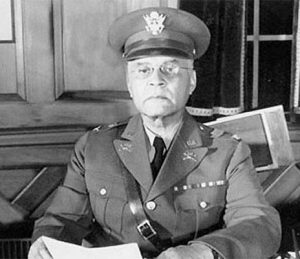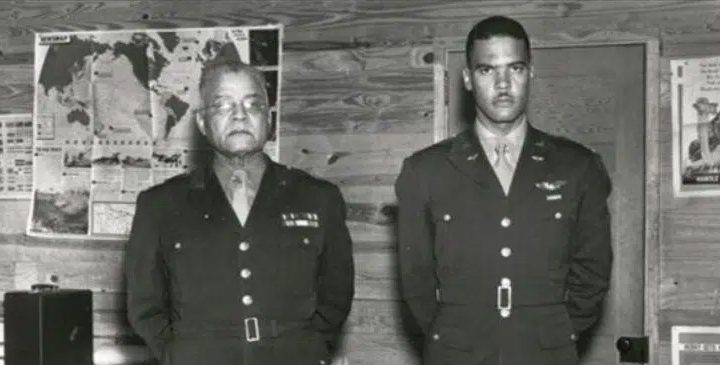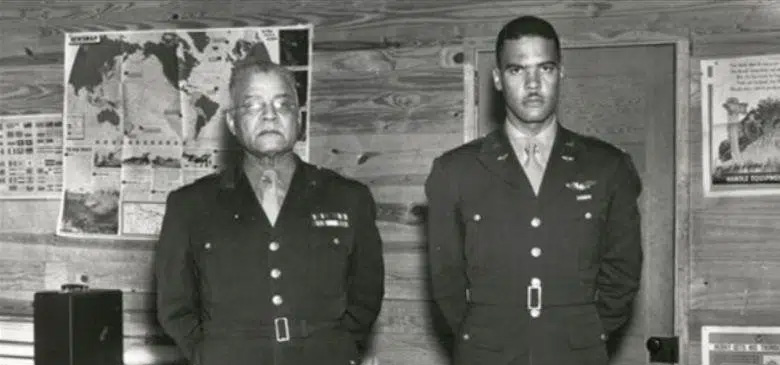Doug Melville knew he had to do something to make sure his family members’ legacies were preserved after seeing the movie Red Tails.
One of the characters, played by Terrance Howard, was based on the life of his great-uncle, Benjamin Davis Jr., commander of the Tuskegee Airmen, but was unrecognizable to the family story Melville had heard most of his life.
“When I went to the screening and went back to my dad, the biggest learning I had was actually learning the family story,” he recalled. “I didn’t know it, and my dad just turned 90 last week and he’s really part of the Silent Generation. He was part of the generation that said, ‘We dealt with this, so you don’t have to deal with this.’”

Benjamin O. Davis Sr.
Melville now knows the story of his relatives who became the first two Black military generals in American history, and he believes it’s a story that will inspire others.
“If you just look at the timeline, Benjamin Davis Sr. became an (Army) officer in 1901. The next Black officer (Air Force) in the United States of America was his son in 1936. And from 1936 until the start of World War II, they were the only two Black officers in the entire United States military out of 335,000 soldiers.”
What these two men gave their country and their place in history is extraordinary by any measure.
“My great-grandfather, Ben Davis Sr., and grandfather, Ben Davis Jr., were the first two Black generals in American history,” Melville said. His father is an adopted son of his grandfather, meaning he was his nephew but raised as his son.
After seeing the movie and realizing the full story had not been told, Melville knew he needed to research the true story and write it in a book.
 That new book is titled Invisible Generals, the story of the first two Black generals in American history, a father and a son duo.
That new book is titled Invisible Generals, the story of the first two Black generals in American history, a father and a son duo.
“I wanted to make sure I was giving the reader firsthand accounts [of] what took place in the lives of these two men,” the author said. “They were the ones who were really out there physically putting their lives on the line, but also in the boardrooms and in the meetings, really talking about the importance of equality.”
Such stories matter to Melville not only because of his family legacy but also because of his own work as a leader in diversity and equity education for the corporate world today.
When Melville had the privilege of attending a ceremony where Former U.S. President Bill Clinton honored his grandfather for his service to the country, he began asking more questions about his family story. That family history changed his career path, too.
“I switched my career to become a diversity officer so I could ensure that other people who are invisible in corporate environments would become visible. I would rather do a job or a role that had some type of force for good than just sales jobs.”
He also began to learn more stories from his father, who is a quiet, deeply spiritual man who hadn’t talked much about the groundbreaking roles his family had filled.
“They were the first two Black generals in American history. He knew they were two of the first, but he actually didn’t even process that. I had to tell my dad: ‘They were the only two Black officers,’ and then he was like, ‘Oh, I guess you’re right.’”
Thus, father and son learned together about their legacy.

Benjamin O. Davis Jr.
This is Melville’s first book, so learning how to document the family story and set it in historical context presented a learning curve.
“Researching the details and making sure it was factual was tough, because the devil is in the details, and I wanted to make sure I got the details right,” he said.
“For me, it’s so personal. My grandfather got me my first car, my first golf clubs. He wanted me to golf because it was so important. And he wanted me to have a car with four doors so I could drive around my friends. And he bought me my first computer because he wanted me to know how to type. Paid for my college so my parents wouldn’t have to think about it. He was the center of the family, and he was so loving.”
Melville wanted to tell a story that would make both his grandfather and his father proud of him.
The book details more than that of the family history, though, across five generations. The family story begins with his great-great-grandfather, Louis Davis, who died in 1930. He had become one of the first Black people hired to work for the federal government, serving in the Department of the Interior.
His son, Benjamin O. Davis Sr. (1880–1970), became America’s first Black general, serving in the Army. His son, Benjamin O. Davis Jr. (1912–2002), was commander of the Tuskegee Airman and graduated from West Point. He later become the first Black general in the Air Force.
While Ben Jr. never had a biological son, he raised his nephew, L. Scott Melville, from the time he was 6. Ben encouraged him to go into law, to help make the changes needed to make America more equitable. Scott Melville became one of Connecticut’s first Black Superior Court judges.
Doug Melville, the book’s author, is the youngest of three children born to Scott and Sonja Melville.
Now, he hopes future generations will be inspired.
“For me personally, I wanted to tell a story our children could read and be inspired about,” he said. “These two men believed in the American dream, even when it didn’t seem possible to attain.”


